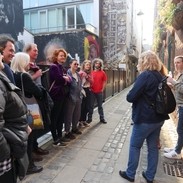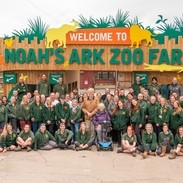VisitBritain/Diensen Pamben

Better Business case study: Simpsons Wine Estate
Simpsons Wine Estate embraces a holistic sustainability ethos that permeates every aspect of its operations: vineyards, winery, staff, products, visitor experiences, and community engagement. Owners Ruth and Charles Simpson prioritise resource efficiency and environmental responsibility, laying the foundation for long-term success.

You must accept "Targeting" cookies from in order to watch this video, as YouTube automatically sets cookies of this type.
“The work we’ve done on sustainability has meant creating a more resilient business”.
Ruth Simpson, co-owner
Business Benefit: Boost business resilience
The right environment – from soil health to climate conditions – is inextricably linked with the success of a vineyard. Believing in a holistic approach and recognising the need to address climate risks, the Simpsons Wine Estate team has implemented measures to minimise the environmental impact of the entire wine-making process, from grape cultivation to product distribution.
Sustainable farming practices maintain natural habitats, minimise the use of pesticides and promote a healthy ecosystem. These sustainability activities represent essential, strategic investments in the longevity and resilience of the business.
The wine’s overall carbon footprint is reduced by installing a 30kw set of solar panels, which covers all normal office and winery functions at optimum output, with just a five-year payback period. The team have also switched to lighter bottles, are working to minimise the water used per bottle of wine and have invested in the necessary infrastructure to dispose of the winery wastewater responsibly. Suppliers are selected for their ability to provide traceability across their supply chain and product design processes includes an emphasis on packaging recyclability.
All these activities ensure that the vineyard can adapt to the changing climate and evolving consumer preferences, safeguarding its place in the English wine industry and securing its future.
Business Benefit: Enhance your story telling
In a circular economy, materials never become waste. Simpsons has taken this journey to heart by considering all facets of its business and are taking action in the most creative ways. To help minimise waste and create a more sustainable production cycle, Simpsons have established partnerships with local suppliers and farmers to create closed-loop supply chains, in which by-products and waste from one process become resources for another. These innovative sustainability initiatives create authentic, compelling stories too, bringing the circular economy to life. For example, local sheep graze the vineyard in winter; elephant manure from the nearby zoo, when composted with the discarded grape marc, contributes to the production of a natural fertiliser; and a local artisan crafts pinot noir soaps from the sediment created during the vinification process. Guests on tasting tours also learn about how sustainability is embedded into all aspects of the production process.
Simpsons’ ‘Sustainable Wines of Great Britain certification’ adds credibility its sustainability claims. The accreditation logo on their bottles is a selling point to the growing numbers of consumers interested in sustainability, helping set the business apart in a competitive market.
VisitBritain/Diensen Pamben

“This generation has an expectation that as a business you’re … creating a more sustainable product offering… People are much more knowledgeable about sustainability and have certain expectations on the products that they choose …. It’s a product with integrity”.
Ruth Simpson, co-owner
Simpsons’ commitment to environmental stewardship creates a compelling story that tells customers and visitors about much more than wine-making. Their story is about resilience, integrity, protecting the environment and planning for the future.
Find out more on the VisitEngland Business Advice Hub and Simpsons Wine Estate
Taking the next steps - Low cost, low carbon switches for your business
Incorporating care for the local environment into your business can enhance your appeal to customers while creating ways for them to leave a positive impact. Here are some tips to help strengthen their connection with nature:
Design your visitor offer to have a low footprint: Make sure that the experiences or guidance you offer guests don’t encourage behaviours that can be damaging or add to problems such as overcrowding.
Design experiences with nature in mind: Celebrate the natural environment by creating meaningful, mindful experiences for your guests. For example, if your business has great views you could introduce a sunset gazing hour inviting all your guests to have a drink and enjoy the sunset and the beauty of the area around your property.
Promote rejuvenation and the power of reconnecting with nature: With wellbeing an important consideration for many, you can use the rejuvenating powers of nature to encourage guests to engage with the environment in mindful ways, such as nature walks, stargazing or forest bathing.






